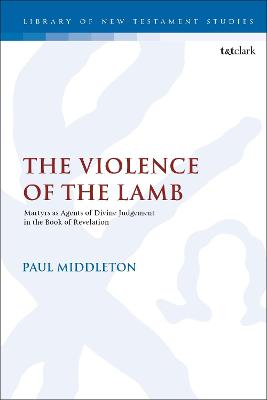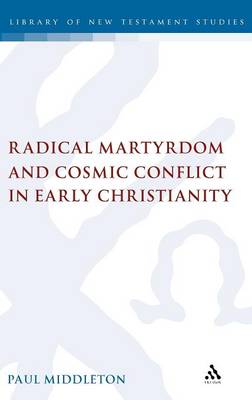The Library of New Testament Studies
1 primary work • 2 total works
Book 586
The act of martyrdom in the worldview of the Apocalypse has been considered to be an exemplification of non-violent resistance. Paul Middleton argues here, however, that it is in fact a representation of direct participation by Christians, through their martyrdom, in divine violence against those the author of Revelation portrays as God's enemies. Middleton shows that acceptance of martyrdom is to grasp the invitation to participate in the Revelation's divine violence. Martyrs follow the model laid down by the Lamb, who was not only slain, but resurrected, glorified, and who executes judgement.
The world created by the Apocalypse encourages readers to conquer the Beast through martyrdom, but also through the experience of resurrection and being appointed judges. In this role, martyrs participate in the judgement of the wicked by sharing the Lamb's power to judge. Different from eschewing violence, the conceptual world of the Apocalypse portrays God, the Lamb, and the martyrs as possessing more power, might, and violent potential than the Emperor and his armies. Middleton believes that martyrdom and violence are necessary components of the worldview of Revelation.
The world created by the Apocalypse encourages readers to conquer the Beast through martyrdom, but also through the experience of resurrection and being appointed judges. In this role, martyrs participate in the judgement of the wicked by sharing the Lamb's power to judge. Different from eschewing violence, the conceptual world of the Apocalypse portrays God, the Lamb, and the martyrs as possessing more power, might, and violent potential than the Emperor and his armies. Middleton believes that martyrdom and violence are necessary components of the worldview of Revelation.
Radical Martyrdom and Cosmic Conflict in Early Christianity
by Paul Middleton
Published 30 June 2006
Several view of martyrdom co-existed in the early Church. The orthodox position, generally accepted by scholars, was that a Christian should choose martyrdom rather than deny the Faith, but should not, on any account, court death. Although it has been recognised that some in the early Church did seek a glorified death, by giving themselves over to arrest, most scholars have dismissed such acts as differing from the accepted attitude to martyrdom in the early Church. Therefore, instances of volitional, or radical martyrdom, have been largely overlooked or sidelined in scholarly investigations into the theology and origins of Christian martyrdom. Paul Middleton argues that, far from being a deviant strand of early Christianity, radical martyrdom was a significant, and widely held idealised form of devotion in the late first to early third centuries. Christian martyrdom is placed within the heritage of Jewish War tradition, with each martyr making an important contribution to the cosmic conflict between Satan and God.
Radical Martyrdom re-examines the presentation, theology, and origins of Christian martyrdom up to the beginning of the Decian persecutions in the light of new perspectives on the subject.
Radical Martyrdom re-examines the presentation, theology, and origins of Christian martyrdom up to the beginning of the Decian persecutions in the light of new perspectives on the subject.

